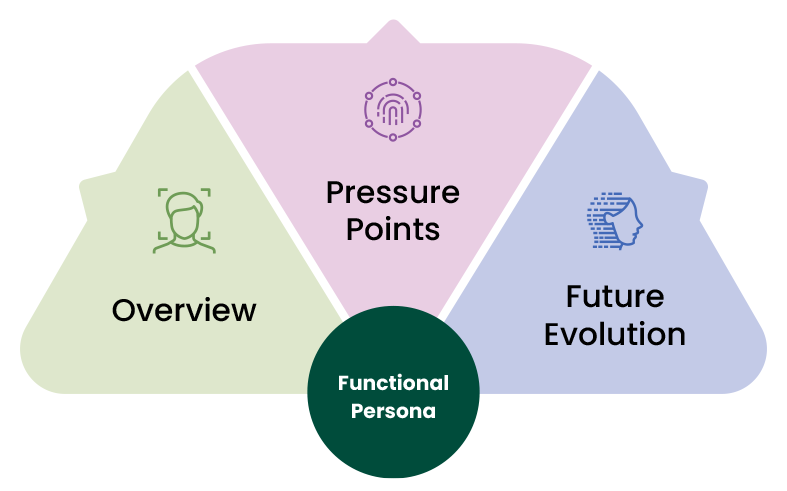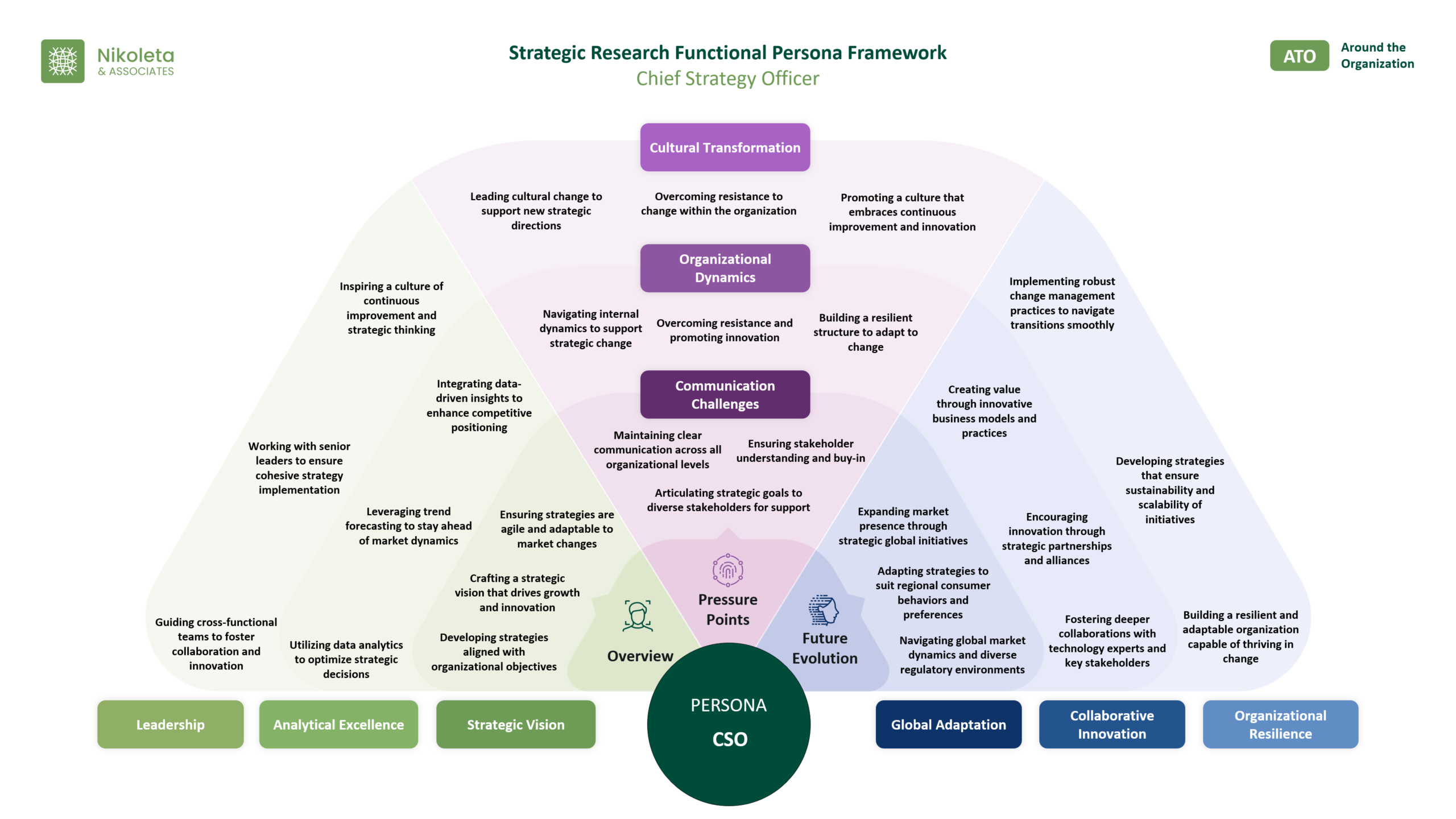Around the Organization (ATO)
Frameworks for Functional Role Clarity and Strategic Growth
Chief Strategy Officer (CSO)
Persona Framework

Welcome to the Chief Strategy Officer (CSO) segment of our Around the Organization (ATO) practice—an area where we encourage a deeper understanding of organizational roles and functions for enhanced clarity, decision-making, and collaboration. Dive into the unique characteristics, challenges, and future evolution of the CSO role.
Learn how CSOs develop and execute long-term strategic plans, identify growth opportunities, and mitigate risks. Discover the critical role CSOs play in aligning the organization’s strategy with market trends, competitive landscapes, and emerging technologies
The Framework

The overview takes a deeper dive into the functional persona by integrating a holistic perspective. This section highlights the unique characteristics, capabilities, and the central role that the functional persona plays within the organizational ecosystem.
The pressure points highlights the challenges and obstacles that individuals within the functional persona may encounter. The importance of the pressure points is aimed to provide guidance towards the overall wellbeing of the functional persona.
The future evolution considers the ever-evolving landscape of market trends and how they intersect with the trajectory of the functional persona. It does not only forecast, but also aims to prepare and shape the functional persona to the change.
Overview
The Chief Strategy Officer (CSO) excels in aligning organizational objectives with market opportunities through strategic foresight, analytical prowess, and adept change management.
The CSO on the executive team is responsible for formulating and implementing strategic initiatives that drive long-term growth and sustainability. This role involves a deep understanding of market dynamics, competitive landscapes, and internal capabilities. The CSO must balance innovative thinking with pragmatic approaches to guide the organization toward its strategic goals. By leveraging data analytics and trend forecasting, the CSO ensures that the organization’s strategic direction remains agile and responsive to evolving market conditions. Additionally, the CSO plays a crucial role in managing and leading organizational change, ensuring that the transition aligns with the company’s strategic vision and minimizes disruption. They work closely with other senior leaders to foster a culture of innovation and continuous improvement. The CSO also monitors the effectiveness of strategic initiatives and adjusts plans as necessary to meet the organization’s evolving needs. Ultimately, the CSO’s work is essential in maintaining a competitive edge and achieving long-term success.
Role Attributes
Change Management: Leading and managing organizational change initiatives to ensure smooth transitions and alignment with strategic goals
Adaptability: Adjusting strategies in response to market shifts and organizational needs
Leadership: Leading cross-functional teams and fostering a culture of collaboration and innovation
Pressure Points
CSOs encounter various pressure points that test their ability to navigate complex strategic landscapes and drive impactful change.
The role of a CSO is inherently challenging due to the need to balance short-term operational demands with long-term strategic goals. One of the primary pressure points is the alignment of the organization’s strategic vision with its current capabilities and market realities. This requires a deep understanding of both internal strengths and external opportunities. Additionally, CSOs must contend with the rapid pace of technological advancement, which can disrupt existing business models and necessitate continual adaptation. The pressure to innovate while maintaining operational efficiency can create tension, as resources are often limited. Effective communication is another critical area, as CSOs must clearly articulate the strategic direction to stakeholders at all levels, ensuring buy-in and alignment. Furthermore, the CSO must manage risks associated with strategic initiatives, balancing potential rewards with possible downsides. Navigating organizational politics and fostering a culture that embraces change and innovation adds another layer of complexity to the role.
Common Pressure Points
Ensuring that strategic initiatives are in sync with the organization’s overall vision and capabilities
Articulating strategic goals and plans to diverse stakeholders to gain support and alignment
Navigating internal dynamics and fostering a culture that supports strategic changes and innovation
Future Evolution
The role of the CSO evolves with the dynamic intersection of market trends and strategic imperatives, shaping the future of the organization.
As markets and technologies continue to evolve, the CSO’s role becomes increasingly integrative and forward-thinking. The future CSO will need to harness advanced data analytics and digital tools to drive strategic decision-making. Building a resilient and adaptable organization will be paramount, ensuring that strategic initiatives are both sustainable and scalable. The CSO will foster deeper collaborations with technology experts and other key stakeholders to leverage insights and maintain a competitive edge. Emphasizing sustainability and long-term value creation will be crucial in navigating global changes and emerging opportunities. Additionally, the CSO will need to develop and implement robust change management strategies to ensure that the organization can adapt to and thrive in a constantly evolving business environment. The role will also involve greater focus on creating value through innovative business models and strategic partnerships. By staying ahead of industry trends and disruptions, the CSO will help steer the organization towards continued growth and success.
Role Evolution Aspects
Developing and implementing effective change management strategies to guide the organization through transitions
Strengthening partnerships and stakeholder relationships to enhance strategic outcomes
Leveraging digital tools and data analytics for strategic insights
The Role of Change in the
CSO Functional Persona
The CSO drives the organization’s strategic agility, ensuring the company can swiftly respond to emerging opportunities and challenges. This role requires a deep understanding of the external business environment and internal capabilities to craft strategies that propel the organization forward. The CSO is tasked with not only envisioning the future but also preparing the organization to navigate through uncertainties. This involves fostering a mindset that values adaptability and resilience, crucial for sustaining growth in a rapidly changing world
For CSOs, adopting strategic change is vital for ensuring the organization’s agility, strengthening market presence, and driving sustainable innovation in an ever-evolving economic environment.
How CSOs Can Be Open to and Maintain Change
Implement Flexible Strategies
Develop strategic plans that are adaptable to changing circumstances and can be modified as needed
Encourage Lifelong Learning
Promote continuous professional development to keep the organization’s strategic capabilities current
Prioritize Strategic Flexibility
Develop adaptable strategic plans that can pivot in response to emerging opportunities and threats





















